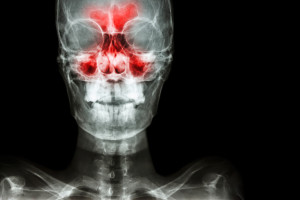This entry was posted on Monday, December 18th, 2017 and is filed under Blog by AENT Associates
 You wake up from a night of restless sleep to a persistent pounding in your cheek and temples. As you move to sit up, your dull headache starts to sharpen, and before you know it, the pain has traveled down your jaw and up to your ear. Your teeth are throbbing, and the pain is intense.
You wake up from a night of restless sleep to a persistent pounding in your cheek and temples. As you move to sit up, your dull headache starts to sharpen, and before you know it, the pain has traveled down your jaw and up to your ear. Your teeth are throbbing, and the pain is intense.
When the pain doesn’t go away, you start to fear you have a larger dental problem on your hands.
Before you go running off to the dentist to check for cavities, you may want to eliminate sinus inflammation as the source of your problem.
What’s Going On?
Take stock of your tooth pain. If the pain is isolated to your upper teeth, and your back molars in particular, there is a good chance you are suffering from a sinus toothache.
Sinus toothaches are caused by swelling and mucus buildup in your sinuses, which puts pressure on the nerves that run to the roots of your top teeth. In other words, this isn’t a tooth issue – your toothache is merely an uncomfortable symptom of sinusitis.
What Is Sinusitis?
Sinusitis, commonly called a sinus infection, is an uncomfortable inflammation of your paranasal sinuses, the air cavities located in the face. The swelling of the maxillary sinuses is typically what causes sinus toothaches, as these are located in the cheek and nose area right above your top teeth.
There are two main types of sinusitis:
- Acute sinusitis is short-term swelling of the nasal passages that many experience as a side effect of the common cold
- Chronic sinusitis is long-term sinus inflammation lasting for 12 weeks or longer
Sinus infections come with a host of irritating symptoms. If you have any of the following, it may be time to seek treatment:
- Sensitivity or pain in the cheekbones, nose, forehead and other parts of the face
- Discolored mucus
- Post-nasal drip, which can lead to throat irritation and a hoarse voice
- Congestion that prevents easy breathing
- Inability to smell or taste
What Causes Sinusitis?
Sinusitis can be caused by anything that could inflame the sensitive tissue of the sinuses, including:
- Viral infections like the common cold
- Respiratory infections
- Allergies
- Structural abnormalities and growths, like a deviated septum or nasal polyps
- Pollutants like cigarette smoke
- Complications with asthma
How Do I Fix the Problem?
To get rid of your sinus toothache, you’ll need to clear out the mucus and reduce the inflammation in your sinuses. Once the inflammation goes down, there won’t be any more pressure on the nerves leading to your teeth. It may be best to try one of these non-medical, and more affordable or even free solutions, prior to visiting your doctor or an urgent care clinic:
- Sleep – Your body needs downtime to repair itself, especially if your sinus infection is the result of a cold. Be sure to keep your head elevated so you aren’t trapping mucus in your sinuses.
- Hydrate – Drink plenty of fluids, like sugar-free juice and water, to hydrate your sinuses. Try to avoid coffee, as this can make symptoms worse.
- Breathe in steam – Steam can open up your nasal passages and allow mucus to drain. Take a hot shower, breathe in the steam from a homecooked meal or sip some warm, caffeine-free tea. Do this a few times a day for the best results.
- Apply compresses – Warm compresses and towels can be applied to the face to soothe pain.
- Use saline rinses – It’s best to use distilled water, but you can also boil and purify tap water for the same effect. Then, flush your nose with a neti pot, nebulizer or another safe device.
- Tweak your diet – Spicy foods like horseradish, garlic, black pepper and chili peppers can thin mucus. Certain spicy foods can make things worse, so proceed with caution. If you’re not a fan of spiciness, try peppermint.
Most of the time, a sinus infection will go away on its own. However, if your attempts to resolve the issue aren’t helping after a week or so, it may be time to consult a doctor. They may recommend one of the following medicines:
- Expectorants loosen mucus up for better drainage.
- Decongestants dry out your nasal passages. Don’t use these for more than a few days at a time, though, as your congestion may come back with a vengeance.
- Antihistamines alleviate allergies. You may also require allergy injections if your allergies are more severe.
- Corticosteroids reduce inflammation and can be taken as a nasal spray or injection.
- Pain relievers can make your recovery process much more comfortable.
- Antibiotics fight bacterial infections that won’t respond to other methods.
In some situations, an infected tooth leads to a sinus infection. If this is the case, you will need to see a dentist or oral surgeon. They can remove the infected tooth and prescribe any necessary medications to relieve your pain and sinus pressure.
Get Sinus Relief from Allergy & ENT Associates in Houston, TX
Sinusitis can be an extremely painful condition that can develop into a more serious medical issue if left untreated. If you’ve been suffering from a sinus toothache or sinusitis, seek treatment with the board-certified sinus treatment specialists at Allergy & ENT Associates. Whether your sinus issue is a result of allergies, asthma or structural problems, our sinus treatments can provide relief. Our services include surgical treatments like rhinoplasty, septoplasty and functional endoscopic sinus surgery. Call us at (713) MY-SINUS to schedule your appointment today!



